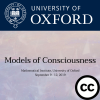John Barnden - Consciousness, metacausation and metadynamism
John Barnden
School of Computer Science, University of Birmingham, UK
I assume that [phenomenal] consciousness is a property physical processes can have, and that it involves pre-reflective auto-sensitivity (PRAS), which is related to the much-discussed pre-reflective self-consciousness [3,4]. I then argue that PRAS requires conscious processes to be directly and causally sensitive to their own inner causation as such, and not merely to their own trajectories of physical states as ordinarily understood. That causal sensitivity is therefore metacausation. Metacausation here is where instances of causation are themselves, directly and in their own right, causes or effects. Metacausation (aka higher-order causation) is rarely discussed at all, and has apparently not previously been linked to consciousness. But the proposal is yet more radical as I merely use "causation" to mean microphysical dynamism. I assume (anti-Humeanly) that the universe's law-governed unfolding is a dynamism irreducible to sheer regular patterning over spacetime of familiar physical quantities (masses, charges, fields, curvatures, etc.). Furthermore, I strongly reify dynamism: spatiotemporally specific instances of it are a ``new'' realm of fundamental physical quantities, themselves dynamically interacting in their own right with other quantities (familiar or new). That dynamic interaction is a new level of dynamism, namely metadynamism, with its own laws explicitly mentioning dynamism instances. As causation is just dynamism, metacausation is metadynamism. The poster summarizes the arguments (revising earlier versions [1,2]) and sketches initial formalization steps for metadynamism. It also indicates how metadynamism might be co-opted to enrich other consciousness theories, notably IIT and Orch-OR.
References:
[1] Barnden, J.A. (2014). Running into consciousness. J. Consciousness Studies, 21 (5-6), pp.33-56.
[2] Barnden, J.A. (2018). Phenomenal consciousness, meta-causation and developments concerning casual powers and time passage. Poster presented at 22nd Conference for the Association for the Scientific
Study of Consciousness, 26-29 June 2018, Krakow.
[3] Gallagher, S. & Zahavi, D. (2015). Phenomenological approaches to self-consciousness. In Edward N. Zalta (Ed.), The Stanford Encyclopedia of Philosophy (Spring 2015 Edition).
[4] Sebastian, M.A. (2012). Experiential awareness: Do you prefer ``it''
to ``me''? Philosophical Topics, 40(2), pp.155-177."
Filmed at the Models of Consciousness conference, University of Oxford, September 2019.




